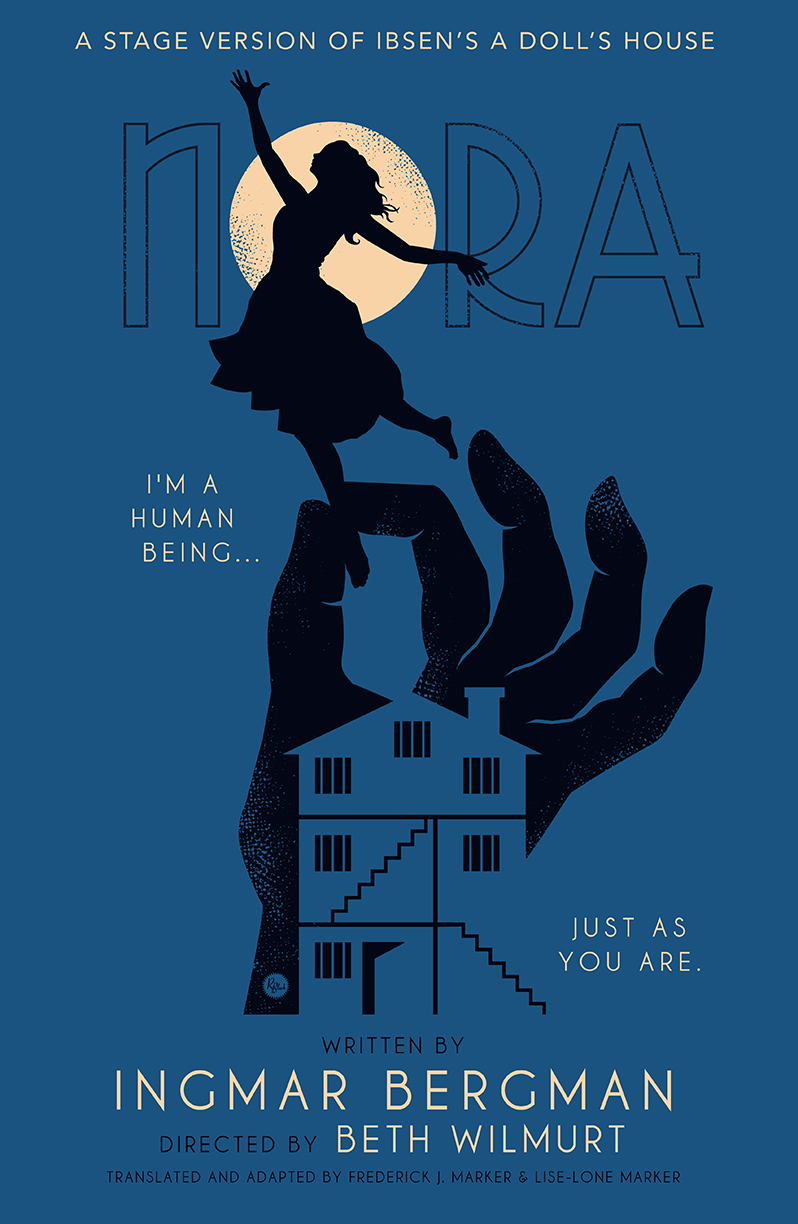
|
|
|
|
|
|
|
|
|
|
| Tickets | Who's Who | Backstage | Press |
|
Featuring
Michael J. Asberry*, Dr. Rank
Adam Elder, Nils Krogstad
Jessma Evans, Nora Helmer
Kevin Kemp, Torvald Helmer
Erin Mei-Ling Stuart, Mrs. Linde
Production Team
Perry Fenton, Assistant Director
Chanterelle Grover, Costume Design Assistant Devon LaBelle, Props Design Maya Linke, Set Design
Molly Stewart-Cohn, Master Electrician
Matt Stines Sound, Design
Annie Tillis*, Stage Manager
Josh Van Eyken, Production Assistant
Maggie Whitaker**, Costume Design
Allen Willner, Lighting Design
Beth Wilmurt, Director
*Member of Actors' Equity Association **Member of the United Scenic Artists Local 829 |
March 16 – April 16 PRODUCTION SPONSORS
The Grubb Company Al Hoffman & David Shepherd Naomi Janowitz & Andrew Lazarus Susan Taylor & Bob Fabry 2017 SEASON SPONSORS Carol Amyx & Donald Kaufman Kitty Bosher Guy Tiphane Peet's Coffee & Tea |
|
|
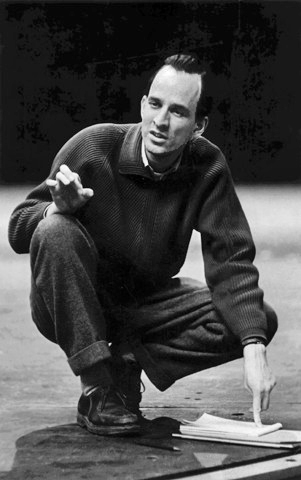
About the Playwright
ERNST INGMAR BERGMAN was a Swedish film and theatre director, writer, theatre manager, dramatist, and author. Bergman wrote or directed more than 60 films and 170 theatrical productions, and authored over a hundred books and articles. Throughout Bergman’s many works, one finds variations on a central theme: dysfunctional families, blood-sucking failed artists, and an absent Almighty all become manifestations of our collective inability to communicate with each other.
As a man of the theatre, Ingmar Bergman is probably best known for his productions of the classics of the stage. Shakespeare, Molière, Ibsen, and Strindberg all had an enormous influence, not only for his work in the theatre, but also for his artistic output in general. Bergman’s exceptional ability to interpret and discover new aspects in historical dramas and to give them life and relevance for our own age made him one of the great theatre directors. For Bergman, the work and its essence, what he regarded as the dramatist’s intention behind the play, constituted one of the three pillars of the theatre, alongside the actors and the audience.
from The Ignmar Bergman Foundation
Meet the Artists
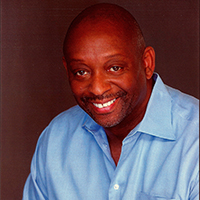 MICHAEL J. ASBERRY
(Actor, Dr. Rank)
MICHAEL J. ASBERRY
(Actor, Dr. Rank)1. What was your first show at Shotgun? Was there anything particularly memorable about it?
My first show at Shotgun was, "There Will Be No Trojan War" back in 2001. It was only the third play that I had ever done, and what was memorable to me about it was that I was cast to play, Ulysses, a character that is not often associated with being a Black Man. It was challenging, satisfying and gave me a definite boost in confidence as I moved forward in my acting career from that production.
My first show at Shotgun was, "There Will Be No Trojan War" back in 2001. It was only the third play that I had ever done, and what was memorable to me about it was that I was cast to play, Ulysses, a character that is not often associated with being a Black Man. It was challenging, satisfying and gave me a definite boost in confidence as I moved forward in my acting career from that production.
2. What was your first impression of this play or the title character, and did working on it change over time? Does anything about this story resonate for you on a personal level?
I had read "A Doll's House" long ago, so my first impression was from a much younger and far less experienced perspective. It was interesting, but it wasn't impactful for me at the time. With Bergman's adaptation, and revisiting it at this stage of my life, it resonates as a powerful statement on self-examination, decision making and taking action to change the course of one's present and future. It's mind-boggling to imagine how Henrik Ibsen would take the initiative to tell this story in the original time period - completely going against the conventional thinking of the era. The fact that it is so relevant today speaks to remarkable forethought and vision, and also demonstrates that we have much more work to do in order to truly embrace the concept of equality.
I had read "A Doll's House" long ago, so my first impression was from a much younger and far less experienced perspective. It was interesting, but it wasn't impactful for me at the time. With Bergman's adaptation, and revisiting it at this stage of my life, it resonates as a powerful statement on self-examination, decision making and taking action to change the course of one's present and future. It's mind-boggling to imagine how Henrik Ibsen would take the initiative to tell this story in the original time period - completely going against the conventional thinking of the era. The fact that it is so relevant today speaks to remarkable forethought and vision, and also demonstrates that we have much more work to do in order to truly embrace the concept of equality.
3. What's something you love about your work?
Having the privilege to inhabit the personality of the characters that I portray, I learn so much about different cultures and lifestyles and I get to tell stories that can potentially alter an individual's way of thinking. Seeing people moved from laughter, to confusion, to tears... the passion and teamwork that goes into eliciting those emotions... that's what I love about my work.
Having the privilege to inhabit the personality of the characters that I portray, I learn so much about different cultures and lifestyles and I get to tell stories that can potentially alter an individual's way of thinking. Seeing people moved from laughter, to confusion, to tears... the passion and teamwork that goes into eliciting those emotions... that's what I love about my work.
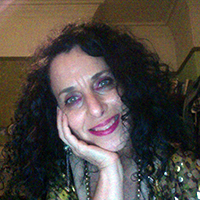 MAYA LINKE
(Set Design)
MAYA LINKE
(Set Design)1. What was your first show at Shotgun? Was there anything particularly memorable about it?
My first show at Shotgun was HARRY THAW HATES EVERYBODY. It was technically a challenging show because I designed a 3 tiered giant chandelier in which each tier collapsed individually at 3 different moments. And one tier fell all the way to the ground from the grid in some final moments. It was beautiful but the crew was exhausted! The show didn't receive the best reviews from the Chronical so Shotgun suffered a bit in regards to this. I was heartbroken due to having worked so hard with the team to create something we all believed in. Ah the glories of theater!
2. What was your first impression of this play or the title character, and did working on it change over time? Does anything about this story resonate for you on a personal level?
When I read the Wilder script, which was the first script Shotgun sent me, I felt a lot of tension in my stomach. A certain dread. With NORA, I didn't feel this initially. I actually felt that her character was stronger and actually found myself missing that initial anxiety from my first read. However through Beth's blocking and interpretation, I discovered that anxiety again but in a different way. I really love how Beth presented the arc through a sensitive, smart, feminine, psychological and very deep lens.
3. What's something you love about your work?
I love how actors seem to fall in love with the sets, and the worlds I have created for them. With all my shows, they have come to me to express this and it gives me so much pleasure to know that they "feel" the world around them. It is imperative to me that my sets are another character that live and breathe and have emotion; That there is a visceral energy that connects it to the cast and to the audience. And through amazing collaborations with theaters and the directors I have worked with, I am lucky to say that I have been able to achieve this.
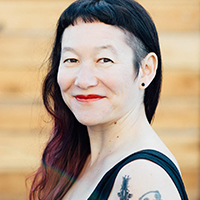 ERIN MEI-LING STUART
(Actor, Christine Linde)
ERIN MEI-LING STUART
(Actor, Christine Linde)1. What was your first show at Shotgun? Was there anything particularly memorable about it?
I was in Mark Jackson's "The Forest War" ten years ago. I was a kurogo (on stage assistant) and, briefly, a soldier. At the time I did not consider myself an actor. I was a dancer and choreographer! It was the beginning of my fascination with the different ways in which actors and dancers work, and with how to blend the best parts of each approach in my work as a performer and theater maker.
2. What was your first impression of this play or the title character, and did working on it change over time? Does anything about this story resonate for you on a personal level?
At first, looking at Nora through the eyes of my character (Christine Linde), I have to admit, I judged Nora to be a little flighty and naive. But as we worked, I found that neither I nor Christine saw her that way. Well ok, sometimes she is flighty. Of course she is. As she says, near the end of the play, she's a human being. She's complex. She is both privileged and oppressed. She's caring and sometimes careless. She's incredibly tough and resourceful. I think we watch a part of her wake up over the course of the play, and as we non-morning people know, waking up is hard.
3. What's something you love about your work?
I love the collaborative nature of theater making. Nothing makes me happier than working with a group of beautiful weirdos to understand the world by making performance things.





